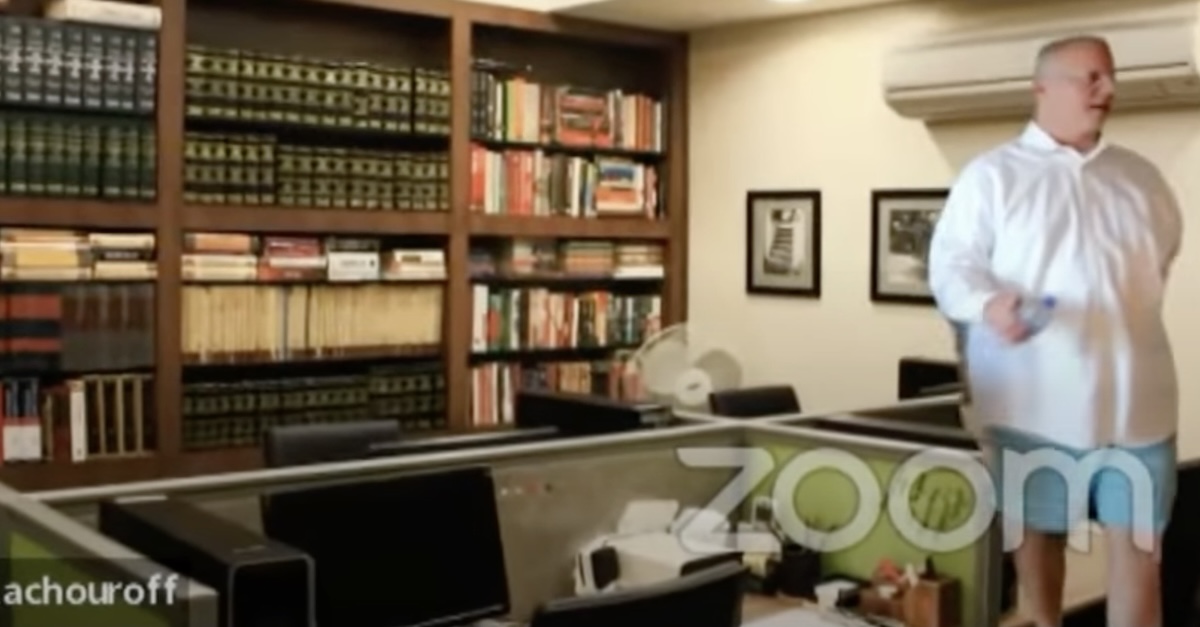
Main: Mike Lindell gives a thumbs-up as he passes by a rally for supporters of former President Donald Trump, Tuesday, April 4, 2023, in West Palm Beach, Fla. (AP Photo/Wilfredo Lee). Inset: Attorney Christopher Kachouroff, who allegedly submitted an AI-generated court filing rife with errors in a defamation case against Lindell (YouTube/Inside Edition).
A federal judge in Colorado issued a scathing rebuke of MyPillow CEO Mike Lindell for allegedly submitting a court filing rife with errors because his attorney allegedly used a generative artificial intelligence program, citing several court cases that don’t exist. The filing came in connection with a defamation lawsuit against the pillow magnate filed by Eric Coomer, the former head of product security for Dominion Voting Systems, over the numerous false claims levied against him and the company by Lindell following the 2020 presidential election.
According to a six-page order from U.S. District Judge Nina Y. Wang, the incident began when Lindell’s attorney, Christopher Kachouroff, came unprepared to an April 21, hearing. During that hearing, Wang questioned Kachouroff about a number of errors in an opposition motion he had signed and filed.
“These defects include but are not limited to misquotes of cited cases; misrepresentations of principles of law associated with cited cases, including discussions of legal principles that simply do not appear within such decisions; misstatements regarding whether case law originated from a binding authority such as the United States Court of Appeals for the Tenth Circuit; misattributions of case law to this District; and most egregiously, citation of cases that do not exist,” Wang wrote. “Despite having every opportunity to do so, Mr. Kachouroff declined to explain to the Court how the Opposition became replete with such fundamental errors.”
Kachouroff initially claimed that he had simply “made a mistake” and accidentally “paraphrased” some cases, but eventually told the court that he had “given the cite checking to another person.”
“Time and time again, when Mr. Kachouroff was asked for an explanation of why citations to legal authorities were inaccurate, he declined to offer any explanation, or suggested that it was a “draft pleading,” the judge wrote.
Wang wrote that it wasn’t until she “directly” asked Kachouroff whether his work was the “product of generative artificial intelligence” that the attorney admitted it was.
The “pervasiveness of the errors” in Kachouroff’s filing were so glaring, that Wang said she was even skeptical of his claim that he had “personally outlined and wrote a draft of a brief before utilizing generative artificial intelligence.”
Referring to the submission as “wholly deficient,” Wang ordered the defendants to show cause as to why the court should not sanction Lindell, MyPillow, Kachouroff, and anyone else associated with the motion. She also threatened to refer Kachouroff to disciplinary proceedings for violating the Rules of Professional Conduct.
The defendants in the case have until May 5, to file responses to Wang’s order to show cause regarding sanctions and disciplinary proceedings.
This was not the first time that Kachouroff has been caught with his pants down during court proceedings — literally. During a February 2024 hearing in Georgia, Kachouroff, who represented one of the co-defendants in the case against Donald Trump and his cohorts for alleged election interference, appeared on camera for a Zoom hearing, walking around his office sans pants.

Kachouroff on a February 2024, Zoom hearing stemming from Trump’s alleged election interference in Georgia (YouTube/Inside Edition).
Love true crime? Sign up for our newsletter, The Law&Crime Docket, to get the latest real-life crime stories delivered right to your inbox.






